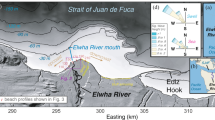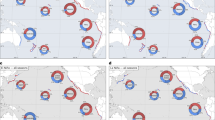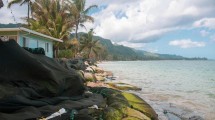Abstract
IN 1938, W. V. Lewis1 pointed out that the general line of a shore tends to be at right angles to the direction of dominant wave-attack, and that as a bay becomes adjusted to this attack it tends to become asymmetrical, with the longer, smoother side facing the quarter from which the dominant waves approach. In 19402, I suggested that the theory applied by Mr. Lewis to beach material and easily eroded cliffs might be developed to explain the outline of the larger bays of south-West England. I showed that this would account for the fact that their eastern sides have been rendered comparatively smooth, with blunted headlands, while their western sides have been protected from dominant wave-attack, so that their indented minor bays have been preserved between angular promontories.
This is a preview of subscription content, access via your institution
Access options
Subscribe to this journal
Receive 51 print issues and online access
$199.00 per year
only $3.90 per issue
Buy this article
- Purchase on Springer Link
- Instant access to full article PDF
Prices may be subject to local taxes which are calculated during checkout
Similar content being viewed by others
References
Lewis, W. V., Proc. Geol. Assoc., 49, 107 (1938).
Arber, M. A., Nature, 146, 27 (1940).
Author information
Authors and Affiliations
Rights and permissions
About this article
Cite this article
ARBER, M. Factors Controlling the Atlantic Coastline of Europe. Nature 162, 741–742 (1948). https://doi.org/10.1038/162741b0
Issue Date:
DOI: https://doi.org/10.1038/162741b0
Comments
By submitting a comment you agree to abide by our Terms and Community Guidelines. If you find something abusive or that does not comply with our terms or guidelines please flag it as inappropriate.



